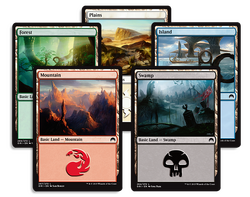Tapland
Taplands is the nickname for lands that usually produce multiple colors of mana and generally enter the battlefield tapped during some point in the game and have no additional drawbacks, though mechanics to have these lands enter the battlefield untapped may be present.[1] This is the most common drawback given to lands, thus a multitude of cycles of such lands was created over the course of several years. Strangely enough however, such lands were considered "too good" for a long time, until Randy Buehler suggested them during one of his first development meetings for Invasion after joining R&D.[2]
Tapping circumvention
Many taplands have the ability to circumvent the drawback of entering the battlefield tapped; those are:
- Battle lands — If you control two or more basic lands.
- Check lands — If you control a land with certain basic land subtype.
- Fast lands — If you control two or fewer other lands.
- Reveal lands — If you reveal a land of certain basic land subtype.
- Shock lands — If you pay 2 life.
- Bond lands — If you have two or more opponents.
- Tribal taplands — If you reveal creature of certain subtype.
Pure taplands
These taplands simply enter the battlefield tapped. They have no further effects or drawbacks.
Dual taplands
The first allied-color cycle of this kind appeared in Invasion and was promptly named for their drawback of coming into play tapped.[2] These lands were reprinted in 8th Edition.
- Coastal Tower (
 /
/ )
) - Salt Marsh (
 /
/ )
) - Urborg Volcano (
 /
/ )
) - Shivan Oasis (
 /
/ )
) - Elfhame Palace (
 /
/ )
)
The above cycle was functionally reprinted in Oath of the Gatewatch and later extended to enemy-colors in Shadows over Innistrad. All 10 cards were reprinted as extras in Amonkhet and later Core Set 2019.
|
|
Snow taplands
A second allied-color cycle of taplands was added in Coldsnap. In addition they had the snow supertype and therefore can pay the snow mana cost.
- Boreal Shelf (
 /
/ )
) - Frost Marsh (
 /
/ )
) - Tresserhorn Sinks (
 /
/ )
) - Highland Weald (
 /
/ )
) - Arctic Flats (
 /
/ )
)
Guildgates
Return to Ravnica block included a new cycle of taplands, one for each guild colors combination. Those new dual lands function like the Invasion taplands, except the addition of the Gate subtype on them which is used in reference in some cards of the block for additional effects. Rather than five lands, this mega cycle included ten cards.[3]
Triple taplands
The shard-colored taplands were added with Shards of Alara. The wedge-colored taplands were added with Khans of Tarkir.[4]
|
|
Upside taplands
These are taplands that have an upside when entering the battlefield.
Life-gain taplands
Zendikar includes taplands that have the upside of providing 1 life when entering the battlefield. These are also known as the Refuge lands or Gainlands.[5]
- Sejiri Refuge (
 /
/ )
) - Jwar Isle Refuge (
 /
/ )
) - Akoum Refuge (
 /
/ )
) - Kazandu Refuge (
 /
/ )
) - Graypelt Refuge (
 /
/ )
)
In Khans of Tarkir the above cycle was functionally reprinted and expanded to ten lands.[6]
|
|
The above cycle was reprinted in Fate Reforged with new artwork,[7] and several times more using the same art as in Fate Reforged.[8]
Scry lands
Theros block included taplands that have the upside of letting the player scry 1 when they enter the battlefield.
Drawback taplands
These are taplands that have a drawback when entering the battlefield.
Bounce lands
These are taplands whose drawback is bouncing one land you control back to its owner's hand.
Other variations
Taplands that have no ETB effects, but have other static abilities.
Utility taplands
Utility taplands are taplands that provide a utility effect instead of producing multiple colors.
Pain taplands
The very first cycle of taplands was an enemy-colored cycle of lands that appeared in Tempest, which have an additional drawback of 1 damage.[9]
Sac lands
With a few exceptions all sac lands are taplands.
Tapped manlands
Manlands which produce any form of colored mana are also taplands.
References
- ↑ Mark Rosewater (February 27, 2017). "Get Ready to Dual". magicthegathering.com. Wizards of the Coast.
- ↑ a b Randy Buehler (August 2, 2002). "Tending the Land". magicthegathering.com. Wizards of the Coast.
- ↑ Mark Rosewater (Monday, September 17, 2012). "Return on Investment, part 3". magicthegathering.com. Wizards of the Coast.
- ↑ Blake Rasmussen (September 5, 2014). "The Khans of Tarkir Tri-Lands". magicthegathering.com. Wizards of the Coast.
- ↑ Sam Stoddard (June 26, 2014). "Making Mana". magicthegathering.com. Wizards of the Coast.
- ↑ Erik Lauer (September 8, 2014). "Developing Khans". magicthegathering.com. Wizards of the Coast.
- ↑ Blake Rasmussen (December 24, 2014). "A Fetching Look at Fate Reforged". magicthegathering.com. Wizards of the Coast.
- ↑ Andrew Brown (June 21, 2019). "Fire It Up". magicthegathering.com. Wizards of the Coast.
- ↑ Tom LaPille (January 29, 2010). "A Brief History of Tap Lands". magicthegathering.com. Wizards of the Coast.
